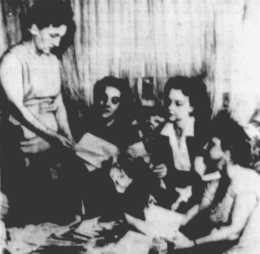In the early 1950s there was a revolt against the “nanny tax” — the requirement that people who hire domestic help in the United States pay social security and medicare taxes on their salary.
Here’s one look at the conflict, from the Sarasota Herald-Tribune:
Texas Housewives Call Tax Collection “Slavery”
New Orleans, (AP) — Those Marshall, Texas, housewives told three judges the government has forced American housewives into slavery by compelling them to be “unpaid tax collectors.”
The rebellious housewives also told the U.S. Fifth Circuit Court of Appeals that the government in their opinion “has no power in the operation of a household.”
The housewives who have gained national attention in their battle against a amendment to the Federal Insurance Act appeared in court with their attorney.
Domestic employes must pay one per cent of their salary for social security under the amended act and the employer contributes a like amount.
The employer must withhold this money from the servant’s wages and the Marshall housewives claimed this is unconstitutional because the government is forcing them to work without compensation.
A lower court ruled against them and then they appealed to the Court of Appeals here.
Eleven housewives refused to pay the tax. But to consolidate the attack on the act, only one housewife, Mrs. Carolyn Abney, sued the government.
She asked that $12.57 the government took from her bank account to pay social security for domestic servants be returned.
Through their attorney, Dean Moorhead of Austin, Texas, the housewives claimed they were being forced into slavery because:
“The withholding provision violates the 13th Amendment … by imposing involuntary servitude upon domestic employers, and that provision deprives domestic employers of their liberty and property in violation of the Fifth Amendment.”
Records And Reports
Moorhead said housewives are required by law to keep records, make reports, and furnish receipts to the government.
“The amendment,” he said, “forces these housewives to be unpaid tax collectors for the government.”
Carlton Fox, government attorney, said arguments presented by the housewives were “inconceivable.”
“Sure these Texas women are good women,” he said, in urging them to “search their conscience” and see if they could turn out a servant too old to work “to face the haunting fears of poverty and old age.”
The court did not indicate when it would rule on the appeal.
That the article begins “Those Marshal, Texas, housewives…” indicates that the protesters must have been pretty well-known at the time. It’s hard to imagine a bunch of people who can afford to hire domestic help and who then complain about the “slavery” of having to do the paperwork of withholding like any other employer, getting much public sympathy for their stand. On the other hand, their concerns probably did resonate somewhat with the ruling class. I wonder also about the extent to which this protest carried with it echoes from the English suffragist protests against paying insurance taxes on their domestic help (protests that were based on a “no taxation without representation” argument, rather than on an objection to the tax itself).
Here’s more, from The Victoria Advocate, (excerpts):
Tax Fighters Beat Agents Into Banks
Marshall, — (AP) — The federal government moved against the bank accounts of tax-rebelling Marshall wives and found several had withdrawn their money.
Two Internal Revenue Bureau agents reached Marshall National Bank with federal seizure warrants, and orders that accounts of the wives and their husbands be made available for inspection.
Carolyn Abney, spokesman for the rebellious wives, said:
“The women are now acting individually and they are all now consulting their individual attorneys. They petitioned their government in an orderly manner and asked for a hearing. An answer to an American citizen’s petition to his government has been a seizure.”
Kenneth Abney, Marshall attorney and husband of Carolyn Abney, said the women will ask the Internal Revenue Bureau that money taken from their accounts be refunded. If they don’t get the money back in this manner, Abney said, they will ask Rep. Wright Patman to introduce a bill permitting them to sue the government.
In a follow-up article, Abney claimed that none of the women had closed their accounts or withdrawn money from the accounts to make them uncollectible, but that the agents or the bank must have been using faulty information to locate them.
Another wire article from 1953 listed the names of some of the other protesters: “Eleana Bradford, Mary Hicks, Winnifred Furrh, Mrs. Joy Quinn, Mrs. Dorothy Martin, Mrs. Celeste Clemons, Mrs. Etheldra Spangler, Mrs. Jennie Abney, Mrs. R.B. Lothrop, Mrs. Rubye Pelz and Mrs. Carolyn Abney.”
The women lost their first case in . The judge, who himself resented paying taxes for his domestic servants, was sympathetic but unmoved by the group’s legal arguments. At the time, the women were represented by Martin Dies, “former congressman and chairman of the first House Un-American Activities Committee.” At the time they were using more anti-red rhetoric. Abney said: “It is a violation of the sanctity of the American home. The law violates a basic American freedom. Already business has been socialized and the American home is the last stronghold against socialism. This may sound dramatic, but we are fighting to preserve the freedoms our forefathers gave to us.”
Vivien Kellems, who had her share of tangles with the tax collector over the years, sent a telegram of support.
In , the group lost its Supreme Court appeal. At first, the women remained defiant and continued to refuse to pay, claiming that the Supreme Court had not really answered the Constitutional question but had only verified the interpretation of the tax statute. They eventually caved in and began to pay the required quarterly taxes.
Abney became the first woman to be elected to the Marshall, Texas city commission in .

